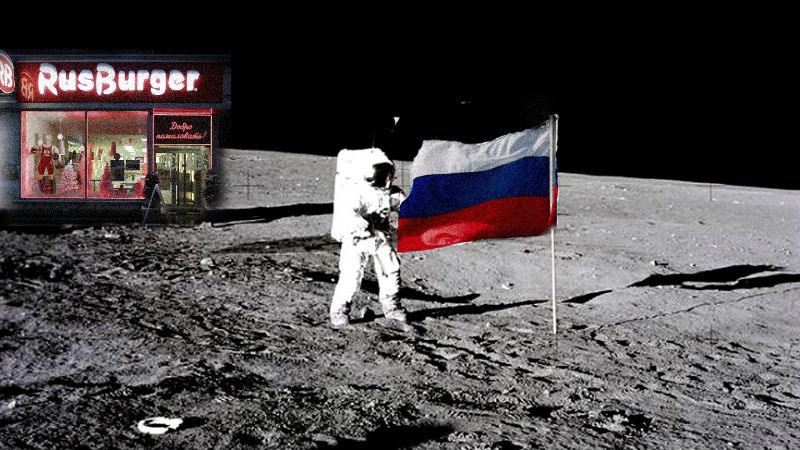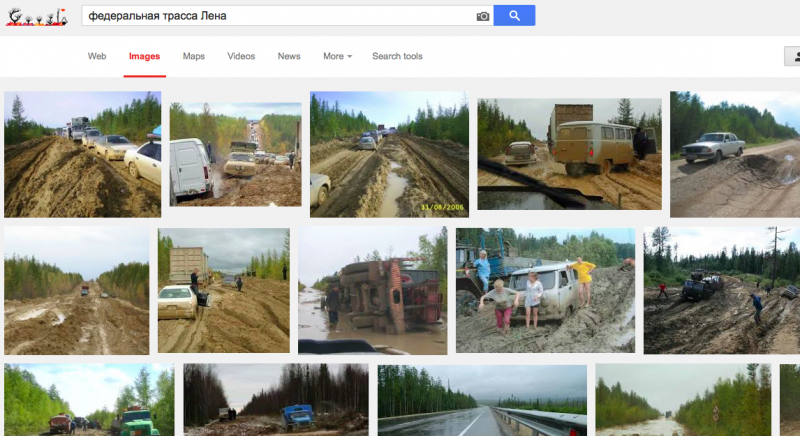
As Russia announces grand plans for Moon exploration, its citizens have more earthly concerns. Images mixed by Tetyana Lokot.
Russia is revitalizing its Moon exploration efforts, with plans to launch a full-scale lunar colonization and development program by 2030. Sounds awesome, right? The RuNet begs to differ.
Russia's relationship with the West has soured around the growing conflict in Ukraine, likely putting to end hopes for space cooperation with Europe (like the timeshare moon base [1]project) and NASA, which recently cut a new space taxi deal with Space X and Boeing [2], presumably to replace buying seats on the Russian Soyuz rockets that currently ferry astronauts to the ISS.
To spite the competition, Russian space agency RosKosmos recently announced a set of new plans [3] for Earth's closest neighbor. By around 2030, RosKosmos head Oleg Ostapenko said, Russia wants to have unmanned explorer vehicles on the Moon, to scout out the surface and determine the best spots for dropping human explorer teams and building lunar settlements (there are even plans to 3-D print all the facilities!). In the course of a few dozen years, as much as 200 Russian settlers [4] would be living on the Moon, RosKosmos claims, fully providing for the settlement and extracting lunar resources for the Earth, such as minerals from the soil and helium from the atmosphere. “We have every reason to believe that what we are planning today can be implemented in full,” chief of RosKosmos Ostapenko said.
In theory, these grand plans for colonizing the Moon sound great, but our readers probably know by now that RuNet users never leave a stone unturned when they decide something is worthy of ridicule. The Moon takeover strategy left most Russians online cold, as they felt the Russian state had enough “earthly business” to be getting on with. Exhibit 1: Russian roads.
Russia to direct all efforts to Moon exploration. Roads what roads. pic.twitter.com/XcnrI4bQeH [5]
— RuNet Memes (@RuNetMemes) September 24, 2014 [6]
The issues of road construction in Russia are well known, immortalized in the apocryphal quip, “There are only two woes in Russia: fools and roads,” attributed to a whole host of various Russian writers. Keeping the phrase in mind, the RuNet users quickly juxtaposed the news of space progress with images of roads across Russia, hinting that maybe, just maybe, it was a bit premature to be planning Moon colonies.
Россия потратит 321 млрд рублей на космическую программу и начнет осваивать Луну: pic.twitter.com/44Mt9BIQRD [7]
— Мuд Роисси (@Fake_MIDRF) September 23, 2014 [8]
Russia will spend 321 billion roubles on space program and will begin Moon exploration.
Incidentally, 321 billion roubles (roughly $8.3 billion, the suggested cost of the Moon colonization project) is 5 (five!) times less than what Russia spent on the Sochi Olympics. This might sound shocking to someone who is not familiar with doing business in Russia or state-financed development projects there, but investigations like FBK's “Sochi 2014: Encyclopedia of Spending” [9] expose the massive scale of pilfering, kickbacks, and money laundering. Many Russians connect the dots and wonder if the lunar exploration project will also be a cover for corrupt officials stuffing their pockets.
@Fake_MIDRF [10] теперь и на Луне будут плохие дороги…
— lizzy bennet (@lethethel) September 23, 2014 [11]
Now the Moon will have bad roads as well…
Most of the images used by netizens criticizing the state's cosmic ambitions are those of Federal Highway M56 Lena [12], known as “the dirtiest road in Russia.” Officially M56 is a federal highway, but long stretches of it are essentially a dirt road, traversable in the winter frosts with a speed limit of 70 kilometres (43 miles) per hour. During summer rains though, the drivers lament that the road turns to mud [13] and smaller vehicles can often get stuck roof-deep. The Russian transportation agency briefly entertained plans to spend $1.7 billion on the renovation of M56 and the construction of a bridge across the Lena river, starting in 2014, but the annexation of Crimea [14] put a damper in those plans, and the renovation has been postponed indefinitely.

An image search on Google for “федеральная трасса Лена” (Lena federal highway) brings up plenty of images.
The road troubles are a real, down-to-earth problem that most Russians have to deal with daily, so they're understandably snarky about RosKosmos’ grand designs on the Moon. How can we be sure, they ask, that Russia won't screw up on the Moon as well? And what about dealing with issues on its own soil, like the Lena federal highway and dozens of other broken or impassable roads?
Федеральная трасса “Луна”.
— Госпожа Сырова (@Judge_Syrova_Ya) September 23, 2014 [15]
Federal Highway “Luna.” (Луна, Rus. Moon)
@PaulSonne [16] and after that they will finally start exploration of Siberia
— Хуёвый Washington DC (@ZhidoBandera) September 23, 2014 [17]
In light of the level of corruption previously exposed in most state-funded initiatives, be it the Olympics or road construction, Russian netizens mostly see the “Moon 2030″ project as yet another get rich scheme for officials—and this time, it might be even harder to hold them accountable, as the Moon is somewhat out of reach for activists’ camera-equipped drones and internet search skills, unlike the elite's summer palaces near Moscow or property in Miami.
Через 10 лет после начала освоения Луны чиновники Роскосмоса окончательно освоились на рынке недвижимости Нью-Йорка и Монте-Карло.
— Мuнобороны Роисси (@FakeMORF) September 24, 2014 [18]
10 years after the start of lunar colonization, the RosKosmos officials are feeling quite at home in the real estate markets of New York and Monte Carlo.
Maybe that's why the Russian officials themselves are so eager to go to space? Deputy Prime Minister Dmitry Rogozin [19], for one, seemed stoked as he toured Star City, a training center for astronauts in Moscow Region the other day, and had only complimentary things to say about the quality of the space personnel at the facility.
Our lady-instructor for working in a space suit is far more attractive than Sandra Bullock from the film “Gravity” pic.twitter.com/Pek7cQaDSs [20]
— Dmitry Rogozin (@DRogozin) September 25, 2014 [21]
As ordinary Russians lament the terrible state of roads on Earth, Russian officials gear up for what could be an exciting new stage of the space race—or could turn out to be a money laundering scheme of truly cosmic proportions. Or maybe what we are seeing here is the devious work of “Lunar Putin [22],” the dark alter ego of the Russian president that political scientist Alexandr Dugin claims is “responsible for Putin’s occasional failures to lead Russia in the right direction.” On the one hand, what better way to distract the world's attention from Russia's actions in Ukraine then to stake a claim on another celestial body? On the other hand, we know how space battles usually end. It's not pretty.